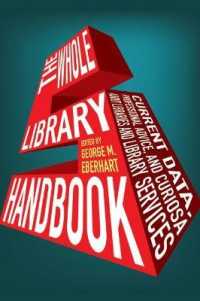Full Description
Deeply embedded in the history of Latin Europe, the vernacular ("the language of slaves") still draws us towards urgent issues of affiliation, identity, and cultural struggle. Vernacular politics in medieval Latin Europe were richly complex and the structures of thought and feeling they left behind permanently affected Western culture. The Vulgar Tongue explores the history of European vernacularity through more than a dozen studies of language situations from twelfth-century England and France to twentieth-century India and North America, and from the building of nations, empires, or ethnic communities to the politics of gender, class, or religion.
The essays in The Vulgar Tongue offer new vistas on the idea of the vernacular in contexts as diverse as Ramon Llull's thirteenth-century prefiguration of universal grammar, the orthography of Early Middle English, the humanist struggle for linguistic purity in Early Modern Dutch, and the construction of standard Serbian and Romanian in the waning decades of the Austro-Hungarian empire. Here Latin, the "common tongue" of European intellectuals, is sometimes just another vernacular, Sanskrit and Hindi stake their claims as the languages of Shakespeare, African-American poetry is discovered in conversation with Middle English, and fourteenth-century Florence becomes the city, not of Dante and Boccaccio, but of the artisan poet Pucci. Delicate political messages are carried by nuances of French dialect, while the status of French and German as feminine "mother tongues" is fiercely refuted and as fiercely embraced. Clerics treat dialect, idiom, and gesture—not language itself—as the hallmarks of "vulgar" preaching, or else argue the case for Bible translation mainly in pursuit of their own academic freedom.
Endlessly fluid in meaning and reference, the term "vernacular" emerges from this book as a builder of bridges between the myriad phenomena it can describe, as a focus of reflection both on the history of Western culture and on the responsibilities of those who would analyze it.
Contents
Contents
Preface: On "Vernacular"
Acknowledgments
Introduction: King Solomon's Tablets
Nicholas Watson
Part I: 1100-1300: The Evangelical Vernacular
1. Using the Ormulum to Redefine Vernacularity
Meg Worley
2. Talking the Talk: Access to the Vernacular in Medieval Preaching
Claire M. Waters
3. The Language of Conversion: Ramon Llull's Art as a Vernacular
Harvey Hames
4. Mechthild von Magdeburg: Gender and the "Unlearned Tongue"
Sara S. Poor
Part II: 1300-1500: Vernacular Textualities
5. Creating a Masculine Vernacular: The Strategy of Misogyny in Late Medieval French Texts
Gretchen V. Angelo
6. Teaching Philosophy at School and Court: Vulgarization and Translation
Charles F. Briggs
7. Vernacular Textualities in Fourteenth-Century Florence
William Robins
8. "Moult Bien Parloit et Lisoit le Franchois," or Did Richard II Read with a Picard Accent?
Andrew Taylor
9. Professionalizing Translation at the Turn of the Fifteenth Century: Ullerston's Determinacio, Arundel's Constitutiones
Fiona Somerset
Part III: 1500-2000: Making the Mother Tongues
10. Purity and the Language of the Court in the Late-Sixteenth- and Seventeenth-Century Netherlands
Jeroen Jansen
11. The Politics of ABCs: "Language Wars" and Literary Vernacularization Among the Serbs and Romanians of Austria-Hungary, 1780-1870
Jack Fairey
12. "Indian Shakespeare" and the Politics of Language in Colonial India
Nandi Bhatia
13. Poets Laureate and the Language of Slaves: Petrarch, Chaucer, and Langston Hughes
Larry Scanlon
Further Reading
About the Contributors
Index






